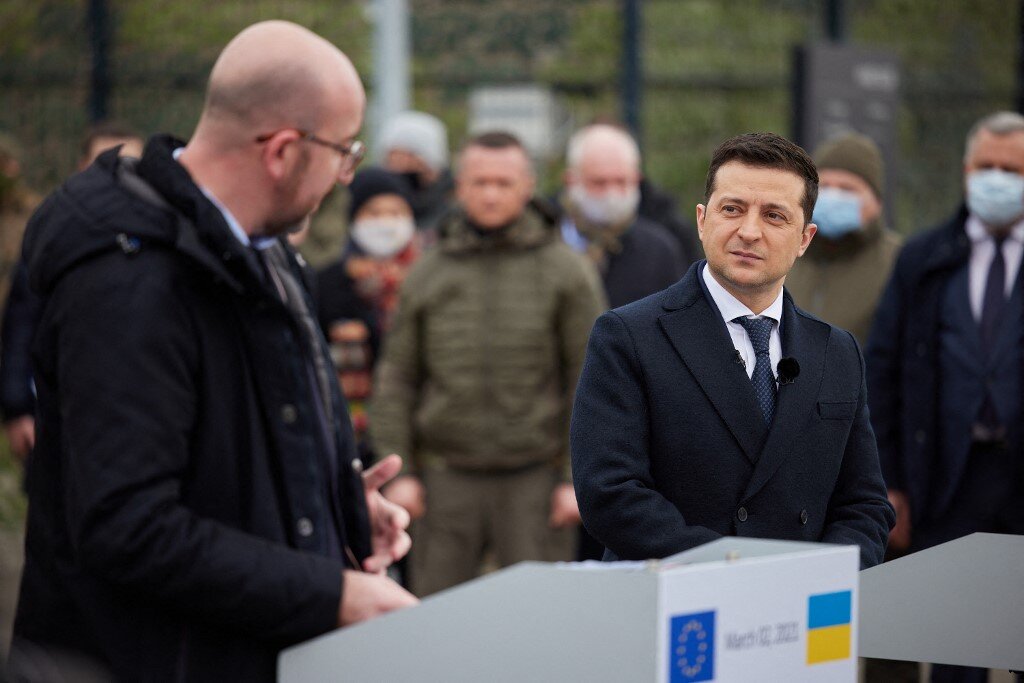President of the European Council Charles Michel has ended his two-day visit to Ukraine.
Together with President Volodymyr Zelensky, on March 2, Michel traveled to Ukraine’s Donbas region, where he praised Ukraine for its commitment to easing the lives of people trapped in occupied regions.
A day later, Michel held a joint press conference with Zelensky to reaffirm the European Union’s support for Ukraine.
“There’s no Europe without Ukraine,” said Michel.
However, no official documents were signed, while Michel’s two-day trip to Ukraine was more of a symbolic gesture than a business meeting.
Donbas trip
The two-day summit between Zelensky and Michel began in the small town of Shchastya, Luhansk Oblast.
In 2014, the town was part of Luhansk, the regional capital of 450,000 people. After the Russian invasion, Luhansk was occupied by Russian-led militants, while Shchastya, home to 11,000 people, became Ukraine’s gateway into the occupied region.
In November 2020, Ukraine built a crossing point in Shchastya connecting it to occupied Luhansk. Russia didn’t allow people to pass.
“Unfortunately, Russia did not mirror the positive steps that Ukraine took to implement the Minsk agreements. Therefore, our economic sanctions will remain,” said Michel on March 2, while visiting the front-line city of Shchastya, Luhansk Oblast.

Ukrainian President Volodymyr Zelensky and European Council President Charles Michel visit the entry-exit crossing point in Shchastya, Luhansk Oblast on March 2, 2021. (AFP)
“Russia is part of this conflict, not a mediator,” he added.
Michel also promised that the EU will invest in the war-torn region.
“This year we are launching a new program to support economic development and public services provision in the region. It will also include funding for checkpoints,” said Michel, without providing further details.
Kyiv talks
On March 3, Zelensky and Michel met in Mariyinsky Palace in Kyiv to discuss bilateral relations. The meeting was attended by Interior Minister Arsen Avakov, Foreign Minister Dmytro Kuleba and Zelensky’s Chief of Staff Andriy Yermak.
However, despite the series of meetings, no breakthrough was achieved.
During a joint press conference, Zelensky said that he asked the EU to broaden its sanctions for human rights abuses.
In late December, the EU adopted a global human rights sanctions regime that provides a legal basis “to impose sanctions on individuals and entities, including on state actors, responsible for human right violations committed anywhere in the world.”
On March 2, the EU used this provision to sanction four Russian top government officials, including Russia’s National Guard Head Viktor Zolotov and Prosecutor General Igor Krasnov, for poisoning opposition leader Alexey Navalny.
“I proposed to introduce the same sanctions against those who commit atrocities in occupied Crimea,” said Zelensky during the press conference.
Zelensky also mentioned that they had discussed the COVID-19 pandemic, the open sky treaty, a revision to the Association Agreement between Ukraine and the EU, and macroeconomic assistance.
“The EU is the most reliable partner of Ukraine,” said Michel, pointing out that the EU has allocated 190 million euros for Ukraine to tackle COVID-19 and an additional 1.2 billion euros in macroeconomic assistance.
